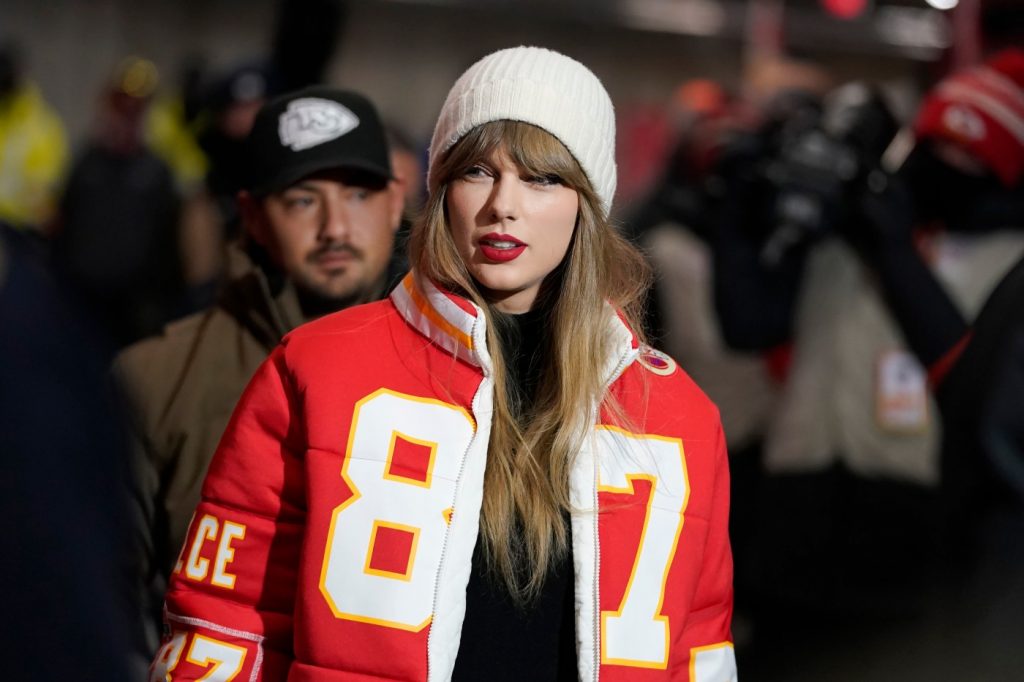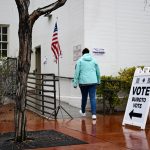In threatening legal action against a Florida college student whose social media accounts track her private-plane flights, Taylor Swift has refocused attention on reports that she’s one of the celebrity world’s biggest polluters of carbon dioxide — just as she’s expected to fly 12 hours in a private plane from Tokyo this weekend to watch boyfriend Travis Kelce play in the Super Bowl Sunday.
Jack Sweeney, a University of Central Florida junior, went public Tuesday with cease-and-desist letters sent from Swift’s attorney. In one letter, the attorney wrote that the pop megastar will “have no choice but to pursue any and all legal remedies” if he did not stop his social media posts that the attorney said constituted “stalking and harassing behavior,” the Washington Post reported.
Sweeney has run accounts that post information about the takeoffs and landings of jet planes and helicopters owned by celebrities, billionaires, politicians, Russian oligarchs and other public figures, the Washington Post reported. His posts also have shared estimates of the carbon dioxide that these aircraft are emitting into the environment. The accounts use publicly available data from the Federal Aviation Administration, while volunteer hobbyists track the aircraft via the signals they broadcast, the Post also said.
As Sweeney told The Post, he sees the letters as an attempt to stop him from sharing public information. He noted that the first letter was sent in December, at a time when Swift faced growing criticism over her flights’ environmental impact, while she was on the road for her Eras Tour — and while she was jetting back and forth across the United States to see Kelce, the Kansas City Chiefs tight end, play in NFL games.
“This information is already out there,” Sweeny told the Post. “Her team thinks they can control the world.”
Sweeney also said: “I think it’s important to note that nowhere do I intend for harm. I actually think Swift has some good songs.” However, he emphasized, “I believe in transparency and public information.”
Sweeney’s accounts previously sparked debate about free speech and the public’s right to certain information when X, formerly Twitter, banned the 21-year-old for sharing information about the private-plane flights of Elon Musk, the platform’s owner, the Post said. Musk accused Sweeney of publishing his “assassination coordinates.”
The letter from Swift’s attorney, Katie Wright Morrone, alleged that Sweeney’s accounts had caused Swift and her family “direct and irreparable harm, as well as emotional and physical distress,” as well as heightened her “constant state of fear for her personal safety.”
“While this may be a game to you, or an avenue that you hope will earn you wealth or fame, it is a life-or-death matter for our client,” Morrone wrote. She added that there is “no legitimate interest in or public need for this information, other than to stalk, harass, and exert dominion and control.”
Morrone wrote that Swift has regularly dealt with stalkers showing up outside her multiple homes, including a man who faces stalking and harassment charges after being arrested last month outside her townhouse in Manhattan, the Post reported.
Swift’s spokesperson, Tree Paine, however, would not say whether her team had any evidence that stalkers used Sweeney’s accounts to track the singer’s travels.
“We cannot comment on any ongoing police investigation but can confirm the timing of stalkers suggests a connection,” Paine told The Post. “His posts tell you exactly when and where she would be.”
For his part, Sweeney told the Post that his accounts offered “an incomplete sketch” of cities Swift might be visiting, similar to publicly available schedules for her concerts or NFL games she might attend. The accounts also don’t say whether Swift is actually traveling on an aircraft being tracked, or where she or other passengers go once the planes land.
Swift has been the subject of reports about her private-jet travels in the past. A 2022 report by Yard, a U.K.-based digital media marketing company, estimated that she was one of “the top 10 celebrity CO2 offenders.”
Even in 2022, when Swift was not on tour, she racked up a total of 170 flights between January and July of that year, Yard found. She spent an estimated 22,923 minutes in the air — or 15.9 days — with her total emissions amounting to 1,185 times more than the average person’s total annual emissions.
Last week, the Associated Press reported that concerns about Swift’s private-plane travel had begun to bubble up on social media, largely due to her high-profile romance with Kelce. NFL fans, Swifties and pretty much everyone else has been inundated with news about Swifting showing up at Chiefs games, though people also began to notice that Swift could only make it to the games by spending a lot of time on private jets.
The talk about Swift’s carbon footprint grew louder louder after the Chiefs beat the Baltimore Ravens on Jan. 29, sending them to the Super Bowl, which is in Las Vegas on Feb. 11.
For Swift to attend the Super Bowl, she will need to fly in from Tokyo, where she will be finishing off four nights of performances for her Eras tour. Of course, Swift was at the Grammys in Los Angeles Sunday night. AP estimated that she’d need to make a make a 19,400-mile round trip from the United States to Japan and back in less than a week.
The AP reported that carbon emissions for any trip depend on many factors, such as flight paths and number of passengers. Traveling 19,400 miles on a Dassault Falcon 900LX, one of Swift’s jets, could release more than 200,000 pounds of carbon dioxide emissions, Gregory Keoleian, co-director of the Center for Sustainable Systems at the University of Michigan, told AP.
That would be about 14 times as much as the average American household emits in a year, AP reported, citing data from the U.S. Energy Information Administration. The AP and other reports say that all air travel creates emissions, but private jets are known to produce much more per person, with a 2023 study showing that private jets emit at least 10 times more emissions per passenger compared to commercial planes, the AP said.
It may not be realistic for Swift to fly commercial, given security concerns. Her fame also could unleash chaos at public airports or for airline crews, AP said.
Paine, her publicist, said that Swift tried to offset the emissions her flights would produce during her tour by buying “more than double the carbon credits needed,” but she did not provide details. But the use of carbon offsets has become controversial because large companies or very wealthy people can use them to justify using private planes or making other unsustainable choices.
Programs that sell carbon offsets by saying they support clean technology or offer other sustainability initiatives are loosely regulated, the AP reported. Moreover, news reports have found that some programs overestimate how much carbon is being captured or engage in questionable practices. In general, environmentalists say that offsets shouldn’t give people a license to pollute and recommend that everyone should reduce unnecessary travel.


